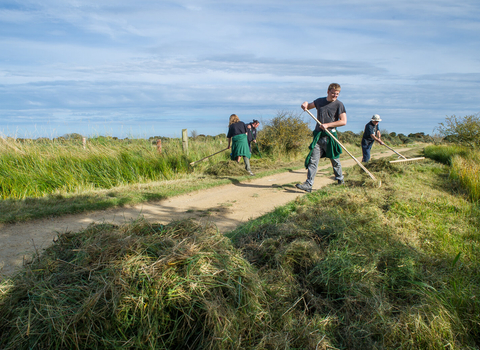It’s 10am on a winter’s morning and a dozen volunteers have assembled in the car park at Ryton Wood, all clad in waterproofs, wellies and hard hats. Loppers, bow saws and an assortment of other tools are loaded into a wheelbarrow and carted off down the path. There may be thick mud and a threat of rain, but these volunteers seem unphased as they head into the wood chatting away, ready for a day’s work. The tasks today are coppicing and dead hedging, essential parts of the reserve’s woodland management which will create and improve habitats for a range of wildlife.
Nature Force is the driving force of our nature reserve management. Looking after 65 reserves is no easy task. But with a committed group of volunteers, taking on a wide range of tasks, we are able to keep managing our reserves throughout the year.
With Nature Force, no two weeks are the same. Normally, volunteers can arrive at Brandon Marsh in the morning, climb onto a minibus and soon find themselves at a nature reserve anywhere in the county. The tasks carried out are wide ranging, and will vary throughout the year. Most of the habitat management work is carried out during autumn and winter. Volunteers may be coppicing trees in one of our woodlands, clearing scrub at the boundary of meadows, or planting new saplings.
As bird nesting season begins in spring, jobs become more focused on the infrastructure, and volunteers may be seen with hammers, staples and fence posts, making repairs to fences and gates to keep them livestock-proof. During summer, as plants grow up quickly, Nature Force will be out putting a stop to the spread of the more invasive species, pulling out ragwort from the meadows and Himalayan balsam along rivers and streams. Soon, the tractors will be out cutting the grass and Nature Force are always on hand to help rake up the hay.
There’s no doubt that Nature Force volunteers are indispensable for our nature reserves. But what is it that makes them want to sign up, and keep coming back for more? I’ve been asking a few volunteers about their personal experiences, and found a number of reasons why they choose to volunteer.
Steve has been volunteering since 2008 – he walked out of his office and started volunteering with Nature Force the following day.
“Beforehand I was doing desk work, but this doesn’t require desk work”, he tells me with a grin. “I enjoy getting out and meeting new people – I’ve met hundreds, whether volunteers or people who are just passing by and interested in what we’re doing”.
“It’s also a great way to get physical exercise,” he continues. “It saves spending money at gyms – and getting plenty of fresh air. I said to my doctor that they should be sending people onto nature reserves more because of the mental health benefits.”
Wendy, who has been a volunteer since September, agrees that the benefits to mental health and wellbeing are overwhelming:
“You feel great. Say you’ve had a bad day and you go out and it just lifts you up really.” For Wendy, Nature Force was the chance to do something different. “I’ve done various jobs but nothing outside. I’m a single parent with kids who are older now so I’ve got a bit more time. I just wanted to come out and do something where I was meeting people and getting out into nature. There’s literally never a dull moment. There’s always something different to see, places to go, people to meet. I really enjoy it. Sometimes I go home and I’m really tired and all I can think is ‘this feels really fulfilling’. Some days we’ve had a laugh and all the things we’ve seen and done is brilliant. I’ve become addicted.”
Katie joined Nature Force at the start of this year and volunteers alongside her part-time job in retail. She has enjoyed the chance to learn new things. “I’ve learnt so much. In the past few weeks I’ve been making notes of the names of different species, plants and fungi – I love fungi. I love the first-hand experience – not just like looking on Wikipedia to find the names of things, you’re actually out here experiencing nature for yourself.”






